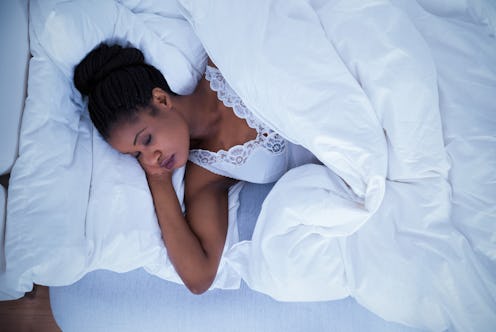Life
Here's The Exact Time You Should Take Melatonin For Better Sleep

If you have sleep issues, jetlag, or frequent insomnia, you may have considered taking melatonin to help you get to sleep. Many people think of it as a natural supplement, because melatonin is a hormone that's naturally occurring in the body that regulates your sleep-wake cycle. But many people who do take melatonin only pop one after they've already been having trouble falling asleep — which is exactly the wrong time to take melatonin. Sleep experts say that the best time to take melatonin depends on your bedtime, but that the supplement works best when you plan ahead.
But first, some science: The hormone melatonin is produced by the body's pineal gland, according to the National Sleep Foundation. "During the day the pineal is inactive. When the sun goes down and darkness occurs, the pineal is "turned on" [by the brain] and begins to actively produce melatonin, which is released into the blood. Usually, this occurs around 9 p.m. As a result, melatonin levels in the blood rise sharply and you begin to feel less alert." The rise of melatonin in the blood, which is maintained for around 12 hours or a full sleep cycle, triggers sleepiness. By contrast, there's virtually no melatonin in the blood during the day.
However, its role in your sleep-wake cycle means that melatonin doesn't work like a traditional sleep aid: It doesn't produce instant sleepiness and cannot "knock you out" in the same sense that sedative-hypnotics, which slow brain activity to allow sleep, do.
"Most people don't realize that if you are ingesting melatonin in a pill format, it takes almost 90 minutes for plasma concentration levels to actually get there," Dr. Michael Breus, clinical psychologist and sleep doctor, tells Bustle. While you might want to pop a melatonin just before you go to sleep or after you've already been having trouble drifting off, this is actually not enough lead time for the concentration of melatonin to accumulate in your bloodstream.
"You should be taking it like an hour and a half before bed, but most people don't," says Dr. Breus. This, he says, is the biggest reason that people who take melatonin don't appear to feel its effects — or, worse, feel groggy the next day.
For best results, 90 minutes at minimum before your standard bedtime is the optimum time for a melatonin dose. Brandon Peters, writing for VeryWell Health, recommended it for up to two hours beforehand, particularly if you're experiencing sleep delay and would like to be asleep earlier than you usually are. People who have difficulty falling asleep and are restless and anxious, they note, should take it 30 minutes before they go to bed, allowing it to gradually enter the bloodstream and assist them in drifting off to sleep naturally.
Preventative melatonin use — if you're using it to bolster the effects of jetlag on a trip, for instance — also needs to be timed properly. The National Sleep Foundation recommends that if you're using melatonin preventatively, you should start incorporating it into your routine "a few days before you leave for your trip. Time it so that you take the supplement two hours before whatever your new time-zone bedtime will be." However, if the time zone change is radical and this will mean you're taking melatonin during the middle of the day, be careful; the drowsiness it induces means your reaction times are slowed.
Melatonin might work for you, but if you want to get the most out of it, you shouldn't take it like a traditional sleep aid. Make sure you get your timings right and it could help you drift off to dreamland.